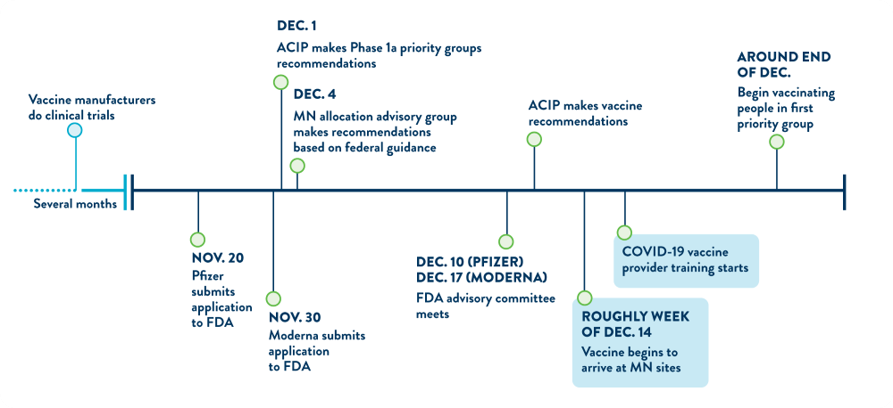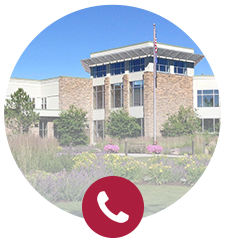[Originally posted December 14, 2020; Updated January 8, 2020]
Two vaccines have now entered the pipeline in the fight against COVID-19. Residents and staff in long term care facilities have begun to receive the potentially life-saving option. PioneerCare is partnering with CVS Pharmacies to provide the vaccine developed by Moderna. Here, in Q&A form, is what we know today as this news relates to our residents and the employees caring for them.
Q: When will the vaccine arrive here?
A: PioneerCare Center residents and staff will receive the first vaccine dose on Saturday, January 9. Vaccination dates for Pioneer Cottages in Breckenridge are currently set for Sunday, January 17, and for Pioneer Cottages and Pioneer Pointe in Fergus Falls on Saturday, January 23. Second doses for each setting will be done approximately 21 days after the first dose. The timeline graphic accompanying this post, provided by the State of Minnesota, gives us some idea of how the process developed up to this point. According to officials from the Minnesota Department of Health (MDH), two factors guide that timeline: the population of health care personnel and long-term-care facility residents within each region, and the population residing in vulnerable census tracts identified by the Social Vulnerability Index (or in plain English, at-risk communities that have higher numbers of COVID-19 cases and higher risks of impact from the virus).
Q: Who will receive the vaccine first?
A: Release of the vaccines will happen in phases. According to the CDC and MDH, Phase 1A includes health care personnel and residents of long-term-care facilities. Depending on available supply, this first phase is divided into sub-categories depending on several factors including the health care worker’s role in providing direct care, the type of facility where one resides or works, and their risk of exposure, risk of transmitting the virus to others, or risk of developing severe illness.
Q: Why should people get vaccinated?
A: Getting vaccinated against COVID-19 is one of the best ways to protect yourself and everyone around you, particularly those who are at increased risk for severe illness. Wearing masks and social distancing help reduce your chance of being exposed to the virus or spreading it to others, but these measures are not enough. Vaccines will work with your immune system so it is ready to fight the virus if you are exposed. Getting these shots will not only protect you from being infected; it will help us take a big step towards ending this pandemic.
Q: How do we know it’s safe since it was developed so quickly?
A: Scientists have worked on coronavirus research for decades starting with the original SARS outbreak and influenza. Scientists only needed to isolate certain things about COVID-19 to begin creating a vaccine because we already know so much about the type of virus. Due to the public health crisis created by the pandemic, many private, government and independent groups came together and cooperated on a vaccine. This scale of cooperation is not typical, and the partnership created resources and information sharing to develop the vaccine faster. For more information about the vaccine’s safety, see this information from the CDC.
Q: What are the side effects of the vaccine? Are there long-term effects?
A: Tens of thousands have participated in trials. Based on those observations, there may be side-effects from the COVID-19 vaccination such as a sore arm, mild, generalized aches, headache, and fever. These side effects are more common after the first injection and not as common after the second injection. This vaccine will not make you sick with COVID-19; the side-effects are a result of your body’s immune system working to understand and create a response to the virus which is needed for your immunity. The long-term effects are still being studied. The first two months show no severe side effects. As with all vaccinations, long-term effects are monitored for up to 10 years.
Q: Will PioneerCare employees be able to work after getting the shot?
A: Yes, they will be able to work after receiving the vaccination. They will still need to follow infection prevention and control practices such as wearing a mask, social distancing, and good hand hygiene.
Q: Should / can I still get a flu shot?
A: It is important you still receive a flu shot. However, it is not recommended to have a flu shot within one month of the COVID-19 vaccine. If you have not already received your flu shot, speak with your supervisor or your doctor about the best plan for receiving flu vaccine and COVID-19 vaccine.
Q: Will residents or staff have to pay for it?
A: No, there will be no cost to individuals for the vaccine.
Q: How many shots will I need and when?
A: The vaccine from Moderna includes two injections. The second injection will either be given 28 days after the first injection. The timeframe for the second injection depends upon the manufacturer and what is written in the emergency use authorization. PioneerCare will make sure this information is available once vaccines are distributed and ready for administration.
Q: How long is the vaccine effective?
A: We don’t know. Because the vaccine is new, the length of immunity is unknown. There are some vaccines that do not require additional shots and there are other vaccines, such as the tetanus vaccine, that require periodic boosters. The vaccine will continue to be studied over time and if additional boosters are needed that information will be released when it is known.
Q: When will residents be vaccinated?
A: Along with healthcare workers, residents are also a priority group for vaccination. We don’t know the exact plan for vaccination; however, we do know that residents will be included in Phase 1 of the vaccine. While care center staff and residents will begin the vaccination process January 9, we are still waiting for finalized timeframes for Pioneer Cottages and Pioneer Pointe.
Q: Is it better to get natural immunity for COVID by getting the virus instead of the vaccine?
A: The short answer is no. In many cases, the way to develop natural immunity to a pathogen is to become sick, have our immune systems respond, and then our immune system “remembers” the pathogen to keep us from getting sick again. However, our immune systems cannot always “remember” the pathogen; or it cannot always fight off the virus. Right now, we don’t know if becoming sick with COVID-19 provides immunity to re-infection with the virus or not. We believe the vaccination does provide immunity to the disease. Additionally, there is no way to predict whether someone with COVID-19 will develop severe disease and suffer significant health complications or not; becoming sick is a risk and there is no way to predict the outcome of illness. You will not become sick from the COVID-19 vaccine.
Q: Where else can I go for accurate information about the vaccine?
A: The Centers for Disease Control has a dependable and up-to-date website with more details: To check it out, go to this link.
